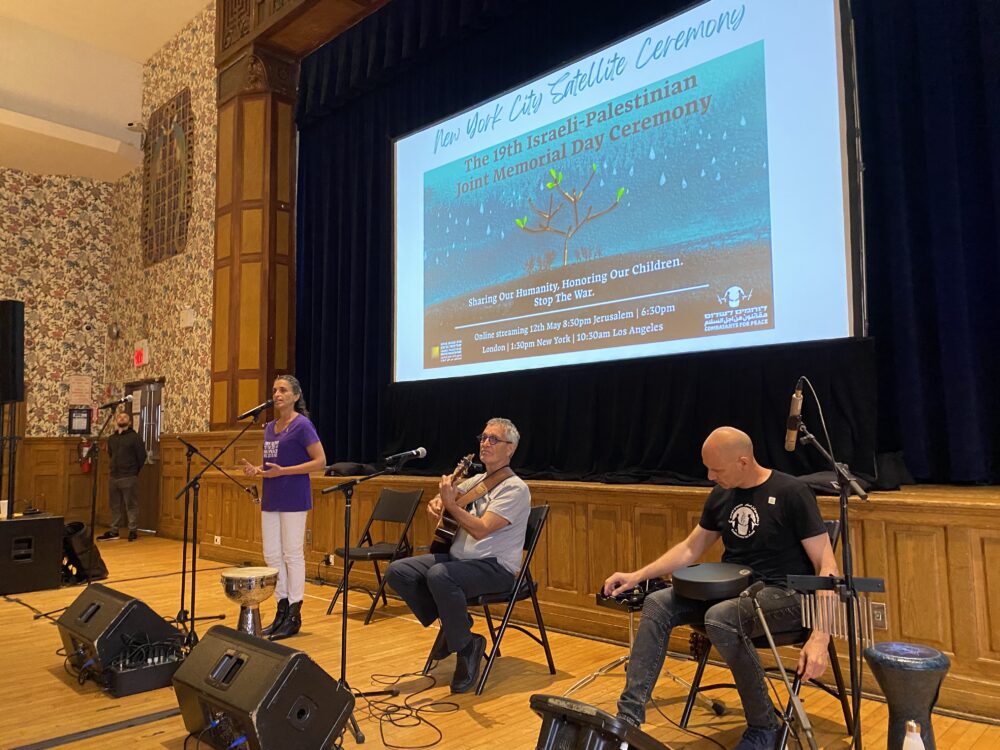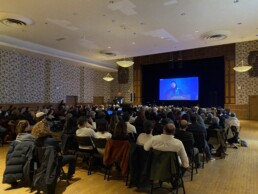In a Brooklyn Synagogue, a Rare Space to Grieve Both Palestinians and Israelis
NEW YORK – Over the last seven months, there have been numerous vigils for the Israelis killed in the Hamas-led massacre of October 7. There have also been many memorials for Palestinians killed by Israel since the country launched its retaliatory assault on Gaza.
But the event on May 12 in Brooklyn was different. It was a joint Israeli-Palestinian memorial service, which provided a rare chance to grieve collectively for both Palestinians and Israelis in the same room.
Over 400 New Yorkers gathered for the somber event in the ballroom of Congregation Beth Elohim on 274 Garfield Place. Audience members gathered in rows of folding chairs surrounding a stage and projector. Some people in the crowd wore the yellow ribbon pins advocating for the return of Israeli hostages, while others wore watermelon t-shirts, symbolic of Palestinian solidarity and resistance.
“When I cry I cry for both of us,” sang Israeli musician Ahinoam Nini at the start of the event, “my pain has no name.” Nini wore a purple t-shirt with a creative twist on a popular protest slogan: “From the river to the sea, only peace will set us free.”
Her musical partner Gil Dror strummed along on the guitar, while volunteer Michael Feigenbaum accompanied them on the drums.
Nini mentioned how she and Dror performed this song while representing Israel in Eurovision in 2009, while performing alongside Palestinian-Israeli singer Mira Awad. The song, “There Must Be Another Way,” was written in the aftermath of the 2008-2009 Gaza war.
“This kind of musical contest, this kind of a war, is the only kind of war I would want to tolerate,” said Nini, speaking of Eurovision. “Some Olympic Games, Master Chef…why do we need the other kind?” The crowd laughed, then Nini launched into another number.

From left to right: Ahinoam Nini (Noa), Gili Dror, and Michael Fiegenbaum
The May event featured a screening of the 19th Israel-Palestinian Joint Memorial Day Ceremony in Jerusalem, organized by Israel-based nonprofits Combatants For Peace and The Parents’ Circle . The “American Friends” of both nonprofits organized the New York satellite event, which included a live-stream of the Jerusalem ceremony, as well as live speakers and music.
Combatants For Peace has been organizing a Joint Memorial Day Ceremony every year in Jerusalem since 2006. The event takes place on Yom Hazikaron, Israel’s memorial day, and it precedes Yom Haatzmaut, the Israeli Day of Independence. It is an alternative to mainstream remembrance day ceremonies, which focus on fallen Israeli soldiers and Israeli victims of terror.
“What makes this year different is the magnitude and catastrophe of loss since October 7th,” said Elik Elhanan, 47, a co-founder of Combatants For Peace who spoke at the New York satellite event. He said it was important to also acknowledge the grief of Palestinians and advocate for an end to the occupation on a “very Israeli day.”
On October 7, Hamas militants invaded Israel and killed 1200 Israelis, while taking over 200 Israeli citizens and foreign internationals hostage, according to Israeli officials. Israel’s subsequent bombardment of the Gaza Strip has killed over 35,000 Palestinians, the majority of whom are non-combatant civilians, according to the Gaza Health Ministry.
A United Nations study says it has been the deadliest year for both sides of the conflict since the commission started tracking deaths in 2008. The war is ongoing. A few days before the ceremony, Israel began its invasion of Rafah: a southern coastal city in which 1.1 million Palestinian civilians are taking refuge, along with Hamas leaders.
Elhinan lost his sister in a Hamas suicide bombing in Jerusalem in 1997 and grew frustrated by how the government politicized her death to justify violence against ordinary Palestinians. He says that even during times of relative calm, the Israeli government can interpret expressions of sympathy for Palestinian civilians as traitorous, or as supportive of terror.
“We’ve been exposed to threats and violence and doxing for many, many years,” said Elhinan, who served as the Israeli coordinator of Combatants For Peace after finishing his mandatory Israeli army service.
After his sister’s murder, Elhinan also became a member of The Parents Circle Families Forum: an organization that aims to connect families of Israelis and Palestinians who lost loved ones in the conflict.
He mentioned how joint memorial ceremonies in Israel were often disrupted by “alt-right thugs” who threw rocks and sprayed urine on bereaved families attending the events.
“What is extremely different this year is that the same alt-right thugs are in the government,” said Elhanan. “The sense of threat is much more heightened,” he added.

Elik Elhanan, his baby and Najla Said convening after the event. Photo: Samuel Eli Shepherd.
Midway through the ceremony, executive director of American Friends of Combatants For Peace, Tiffany Goodwin Van-Camp, announced that the YouTube and Facebook live-streams of the Jerusalem event had been hacked. The crowd gasped.
Thankfully, the tech organizers found an alternative platform to stream the Jerusalem event, which included speakers from both Israel and the West Bank. But it was a reminder of just how contentious these kinds of bridge-building events can be.
Since October 7, there have been an explosion of pro-Palestine protests on college campuses across the world advocating for a ceasefire in Gaza. There have also been pro-Israel marches calling for a return of the hostages. But few demonstrations, even ones thousands of miles away from the violence, have acknowledged both nations’ pain.
“I've been in a lot of spaces where the hostages are talked about, but the Palestinians are not,” said Najla Said, 50, who spoke before Elhanan during the ceremony. “So it was really nice to be in a room where everyone was acknowledging the full reality of the situation and the pain of everybody.”
Said is an actress, writer and “by default an activist since I'm a Palestinian Lebanese American,” she joked. She is also the daughter of Edward Said: the renowned Palestinian-American scholar and professor at Columbia, who wrote about ignorance of the other in Western society.
“When we're put together, it may not always be kumbaya and happiness,” she said, speaking of organizations that bring Israelis and Palestinians into the same room. “There may be tension, there may be arguments, but that is the place from which alternative methods of moving forward can come,” she said.
After the ceremony, audience members lingered in the synagogue lobby while chatting in English and Hebrew. The organizers mentioned an upcoming Joint Israeli-Palestinian Nakba Remembrance Day ceremony later that week: a day which commemorates when over 700,000 Palestinians fled or were forced to flee by Israeli forces during the 1948 war.
Said acknowledged that there was a stark power imbalance between how Jewish spaces usually discuss Israeli and Palestinian losses, but she nevertheless said it was important for Palestinians to acknowledge the suffering of innocent Israelis, too.
“I think we also have to get out of the habit of constantly having like the oppression Olympics or who's been hurt more or who was killed more,” said Said. “None of that matters. Pain is pain,” she said.

